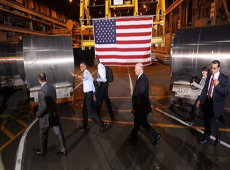
President Barack Obama on Tuesday held up Alcoa's aerospace aluminum plant in the Quad Cities as a bright spot in the U.S. economy.
But Obama did not touch on the issues many business leaders wish he would address: cutting corporate income taxes, reducing regulation and dismantling trade barriers.
The plant, a mile-long gray building that spans the city limits of Bettendorf and Riverdale next to the Mississippi River, is the hub of Alcoa's $3 billion aerospace business. It produces metal for aircraft including the Airbus A380 and the Boeing 747.
About 2,200 people work at the factory, which generated $800 million in revenue last year. While the plant laid off workers in the downturn, it has rehired all of them and hired new workers since December.
The company's engineers created alloys that sent a man to the moon and protect soldiers from improvised explosive devices in Afghanistan.
Obama chose the scene for a 20-minute speech on the economy in which he promoted his administration's new Advanced Manufacturing Partnership.
"Almost every airplane in the world has some kind of Alcoa product in it," Obama said to the crowd of politicians, business leaders and plant workers. "I want to thank all of you for getting me here in one piece."
He stood before a yellow crane hung with an American flag, arguing innovation and a skilled work force are the keys to job creation.
Mike Freemire, the mayor of Bettendorf and owner of two businesses, said he wanted Obama to talk about the uncertainty faced by businesses as a result of taxes and regulations with which compliance can be expensive. Obama did not.
"They need stable environments," Freemire said. "I would hope that the experience the president has had over the last two years would push him back to more balanced policies."
Obama announced that Alcoa will participate in the new manufacturing initiative, which will connect universities and companies to help develop technology that would create high-level manufacturing jobs. The government will spend $500 million on research and development in national security, robotics and product development. Universities and companies will help invent and produce the new technologies and help guide the effort.
"These steps will help us move forward," Obama said. "They'll help us grow our economy today, and will guarantee a better future for our children."
Mary Andringa, president and CEO of Vermeer Corp. in Pella, attended the speech, and said she wanted the president to talk about loosening regulation and freeing trade.
"There's actually a lot of things I think that can be done," said Andringa, who is also president of the National Association of Manufacturers. "There's a lot of burden on businesses with all the regulations right now. Sometimes I think it's unintended consequences."
She gave the example of the Environmental Protection Agency's emissions standards for engines on heavy equipment. Engineers at Vermeer are spending more than half their time designing new, larger engines into existing products. The cost of the new engine for one piece of construction equipment inflates the cost of the product by 15 to 20 percent, she said.
"That's a lot in an economic time when our customers are not able to pay those extra prices," she said. "Wouldn't it be better for our company and certainly for our country to have those engineers working on more innovative things?"
She wants the government to pass a permanent research and development tax credit for corporations and pass more free trade agreements. The United States has 17 free trade agreements, she said, which is too few.
The White House and lawmakers said Tuesday they are approaching a deal to pass free trade agreements with South Korea, Colombia and Panama.
Iowa relies more heavily on manufacturing jobs than most states. In 2010, 17.8 percent of the state's gross domestic product came from manufacturing, compared with 11.8 percent for the nation as a whole, according to the Bureau of Economic Analysis.
Manufacturing employed nearly 206,000 Iowans last month. The state lost 30,000 factory jobs in the economic downturn, but has regained some ground, adding 5,300 factory jobs since the low point.
Alcoa hired 237 in the Quad Cities since December, said Joe Hesse, the plate finishing manager at the plant. The Davenport area's unemployment rate peaked at 10.3 percent last year before dropping to 7.1 percent in April.
"We're very successful right now," said Hesse, 44, who supervises work on the thick sheets of aluminum that make airplane wings, railroad cars, ship hulls and gas containers. "I'd just like to hear how he's going to transfer this to other parts of the economy."
